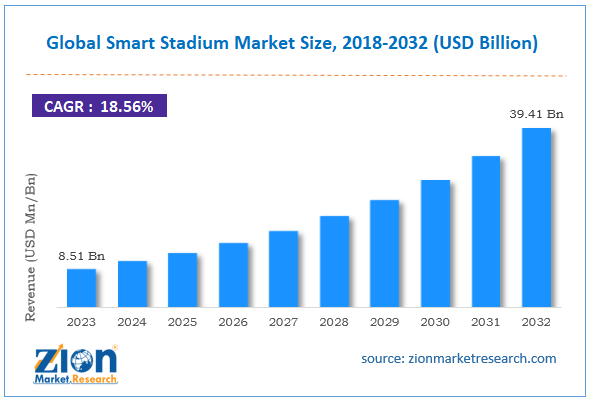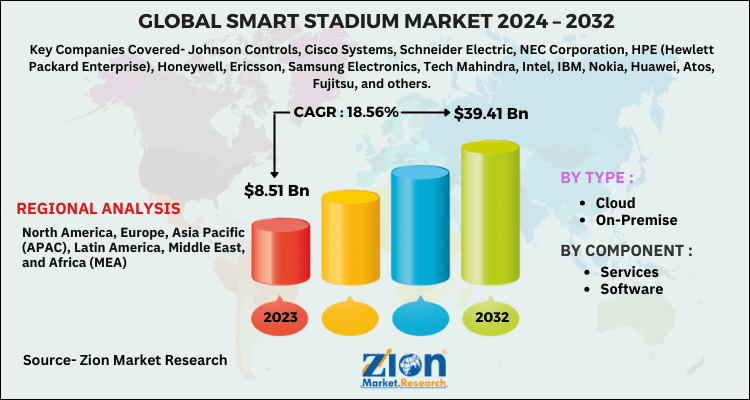Smart stadium Market Size, Share, Trends, Growth Report and Forecast 2032

Smart Stadium Market By Type (Cloud and On-Premise), By Component (Services and Software), and By Region - Global and Regional Industry Overview, Market Intelligence, Comprehensive Analysis, Historical Data, and Forecasts 2024 - 2032
| Market Size in 2023 | Market Forecast in 2032 | CAGR (in %) | Base Year |
|---|---|---|---|
| USD 8.51 Billion | USD 39.41 Billion | 18.56% | 2023 |
Smart Stadium Industry Perspective:
The global smart stadium market size was worth around USD 8.51 billion in 2023 and is predicted to grow to around USD 39.41 billion by 2032, with a compound annual growth rate (CAGR) of roughly 18.56% between 2024 and 2032.
Smart Stadium Market: Overview
Smart stadiums are modern sports venues that focus on using technology to improve fan experience. These novel infrastructure facilities deploy advanced technologies such as cameras, display machines, and sensors to offer a comprehensive sports viewing experience.
Some of the key features included in smart stadiums include easily available information on parking sites and availability, higher security, personalized viewing experiences, integration of virtual reality (VR), and high-speed internet.
In addition to this, smart stadiums are mainly focusing on deploying new applications with extensive features to improve engagement among spectators.
The applications may include real-time information on parameters such as exclusive team-related content, live statistics, ordering food & beverages using the program, and other solutions that allow a sports viewer to enjoy the game without worrying about other factors such as finding the emergency exit in case of an emergency.
The industry for smart stadiums is expected to grow due to increased partnerships between stadium owners and technology companies.
The introduction of novel solutions will generate higher growth opportunities during the forecast period. However, the high cost of large-scale implementation of the technologies will limit the industry's expansion trends.
Key Insights:
- As per the analysis shared by our research analyst, the global smart stadium market is estimated to grow annually at a CAGR of around 18.56% over the forecast period (2024-2032)
- In terms of revenue, the global smart stadium market size was valued at around USD 8.51 billion in 2023 and is projected to reach USD 39.41 billion by 2032.
- The smart stadium market is projected to grow at a significant rate due to the increasing number of stadium-going sports spectators.
- Based on type, the cloud segment is growing at a high rate and will continue to dominate the global market, as per industry projections.
- Based on the component, the services segment is anticipated to command the largest market share.
- Based on region, Europe is projected to dominate the global market during the forecast period.
Smart Stadium Market: Growth Drivers
Increasing number of stadium-going sports spectators will drive the market demand rate
The global smart stadium market is expected to benefit from the rising number of sports enthusiasts enjoying games from stadiums and sports venues.
According to official statistics, the Union of European Football Associations Champions League Final in 2022 registered an attendance of around 75000 spectators watching the game from the stadium hosting the finale.
The rising number of stadiums across the globe, along with growing disposable income, has allowed more people to enjoy games from sports avenues. They get to watch their favorite sports personalities play live in stadiums.
In addition to this, governments across the globe are encouraging solutions that improve spectators' safety. Crowded stadiums can attract the attention of several antisocial fragments of society, leading to acts of pure violence against common citizens.
For instance, in April 2024, reports emerged suggesting that the Islamic terror group ISIS had issued warnings to soccer stadiums across European nations as the region is preparing to host major games in the quarterfinals of the UEFA Champions League.
Such events are likely to promote the use of advanced technologies to detect and report any suspicious activities at stadiums and assist in the prevention of mass attacks.
Increasing partnerships with technology companies and end-users to aid higher revenue generation
Smart stadiums are a product of increased collaboration between technology developers and stadium management teams. In May 2023, JIG-SAW, a leading firm operating in risk management and cybersecurity solutions, announced a partnership with San Diego Padres. It is an American professional baseball team competing in Major League Baseball (MLB). The agencies have partnered to develop a smart stadium using JIG-SAW Internet of Things (IoT) technology.
As per official claims, some of the prominent features of the team’s home stadium, Petco Park, will include assisting with directions to restaurants, seats, toilets, and other locations, along with smartphone integrations for interactive content.
Similarly, in a recent event, Edgbaston Stadium & Warwickshire County Cricket Club announced Intercity Technology will be their IT partner as the cricket club focuses on becoming a smart stadium in the coming years. Such partnerships are likely to improve revenue in the global smart stadium market.
Smart Stadium Market: Restraints
High cost of implementing the technologies at a large scale will limit the industry’s expansion rate
The global industry for smart stadiums is projected to be restricted due to the high cost of implementing the advanced technologies associated with smart stadiums.
According to research-based estimates, deploying face recognition systems on a mass scale can cost more than USD 150,000, depending on the features of the tool and the extent of end-use.
Stadiums with limited funds will be unable to afford sophisticated engineering solutions, especially the ones located in low or middle-income countries.
Smart Stadium Market: Opportunities
Innovation-based growth to generate extensive growth opportunities during the projection period
The global smart stadium market players are expected to adopt an innovation-based strategy to continue generating significant revenue during the forecast period.
For instance, in August 2024, the National Football League (NFL) announced that it would introduce a facial recognition system across 32 stadiums owned by the league.
One of the primary goals of introducing the technology is to allow officials, credentialed media, and guests to easily access restricted areas such as locker rooms, press rooms, and the field. The league is expecting a decline in incidents related to entry using fake credentials after the launch of the technology.
In August 2024, the island country of Cyprus announced that it would upgrade its systems with a highly sophisticated facial recognition tool that will match up to 80 points on an individual's face with existing information in the central database within a matter of a few seconds.
Similarly, the rising use of crowd management tools across stadiums of all sizes will further aid higher market expansion over the projection period. The introduction of Artificial Intelligence (AI) to develop highly functional crowd management tools will be helpful in the future.
Smart Stadium Market: Challenges
Higher risk of cybercrime will challenge the market expansion rate
Incorporating technological and digital solutions in the global smart stadium industry puts these facilities at risk of being targeted by cybercriminals.
The private information stored by applications and programs deployed at smart stadiums can be hacked, thus compromising the privacy of the visitors. In addition, continuous improvements in technological offerings can lead to extreme market saturation.
Smart Stadium Market: Segmentation
The global smart stadium market is segmented based on type, component, and region.
Based on the type, the global market segments are cloud and on-premise. In 2023, the highest growth was witnessed in the cloud segments. Compared to on-premise, cloud-based solutions offer greater flexibility to end-users. Cloud solutions allow exceptional scalability depending on the final application.
Moreover, these tools offer higher security features, making them widely popular among end-users. According to World of Stadiums, around 2,287 stadiums with a capacity of at least 10,000 are available around the globe.
Based on the components, the smart stadium industry divisions are services and software. In 2023, the highest demand was observed in the services segment.
The rising partnership between technology providers and seekers is driving the segmental demand. The software segment is led by increased investments toward innovative solutions with advanced features and higher end-user applications. During the forecast period, the software segment is expected to grow at a CAGR of more than 60.01%.
Smart Stadium Market: Report Scope
| Report Attributes | Report Details |
|---|---|
| Report Name | Smart Stadium Market |
| Market Size in 2023 | USD 8.51 Billion |
| Market Forecast in 2032 | USD 39.41 Billion |
| Growth Rate | CAGR of 18.56% |
| Number of Pages | 225 |
| Key Companies Covered | Johnson Controls, Cisco Systems, Schneider Electric, NEC Corporation, HPE (Hewlett Packard Enterprise), Honeywell, Ericsson, Samsung Electronics, Tech Mahindra, Intel, IBM, Nokia, Huawei, Atos, Fujitsu, and others. |
| Segments Covered | By Type, By Component, and By Region |
| Regions Covered | North America, Europe, Asia Pacific (APAC), Latin America, Middle East, and Africa (MEA) |
| Base Year | 2023 |
| Historical Year | 2018 to 2022 |
| Forecast Year | 2024 - 2032 |
| Customization Scope | Avail customized purchase options to meet your exact research needs. Request For Customization |
Smart Stadium Market: Regional Analysis
Europe is home to a higher number of smart stadiums, according to research
The global smart stadium market will be led by Europe during the projection period. In 2023, the region accounted for nearly 30.01% of the total revenue.
The primary reason for higher regional revenue is the presence of multiple large stadiums across European nations. These stadiums host thousands of spectators in each game, requiring the use of technological solutions to improve spectator safety and overall experience.
In August 2024, Cisco, a leading technology firm, announced a partnership with Allianz Arena, which is home to FC Bayern Munich. The former is now officially the Wi-Fi partner for the stadium. The company will deploy 1,500 Wi-Fi 6 access points with future plans to deploy Wi-Fi 7.
In March 2022, Cisco partnered with Real Madrid with the aim of deploying the largest Wi-Fi 6 stadium network in Europe. The growing number of stadiums with exceptional seating and viewing capacity will further promote regional expansion.
In August 2024, the famous Camp Nou stadium in Spain underwent renovation. The contract is taken by the Turkish company Limak and the renovation is likely to cost around €1.5 billion.
Smart Stadium Market: Competitive Analysis
The global smart stadium market is led by players like:
- Johnson Controls
- Cisco Systems
- Schneider Electric
- NEC Corporation
- HPE (Hewlett Packard Enterprise)
- Honeywell
- Ericsson
- Samsung Electronics
- Tech Mahindra
- Intel
- IBM
- Nokia
- Huawei
- Atos
- Fujitsu
The global smart stadium market is segmented as follows:
By Type
- Cloud
- On-Premise
By Component
- Services
- Software
By Region
- North America
- The U.S.
- Canada
- Europe
- France
- The UK
- Spain
- Germany
- Italy
- Rest of Europe
- Asia Pacific
- China
- Japan
- India
- South Korea
- Southeast Asia
- Rest of Asia Pacific
- Latin America
- Brazil
- Mexico
- Rest of Latin America
- Middle East & Africa
- GCC
- South Africa
- Rest of Middle East & Africa
Table Of Content
Methodology
RelatedNews
HappyClients
Zion Market Research
Tel: +1 (302) 444-0166
USA/Canada Toll Free No.+1 (855) 465-4651
3rd Floor,
Mrunal Paradise, Opp Maharaja Hotel,
Pimple Gurav, Pune 411061,
Maharashtra, India
Phone No +91 7768 006 007, +91 7768 006 008
US OFFICE NO +1 (302) 444-0166
US/CAN TOLL FREE +1 (855) 465-4651
Email: sales@zionmarketresearch.com
We have secured system to process your transaction.
Our support available to help you 24 hours a day, five days a week.
Monday - Friday: 9AM - 6PM
Saturday - Sunday: Closed






